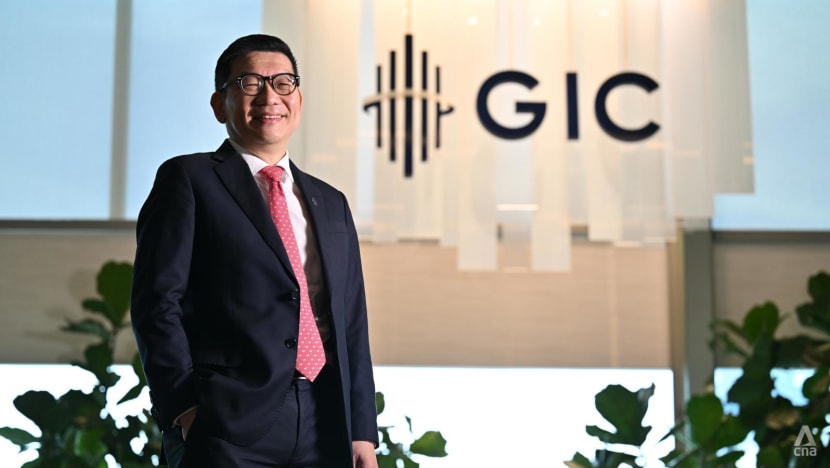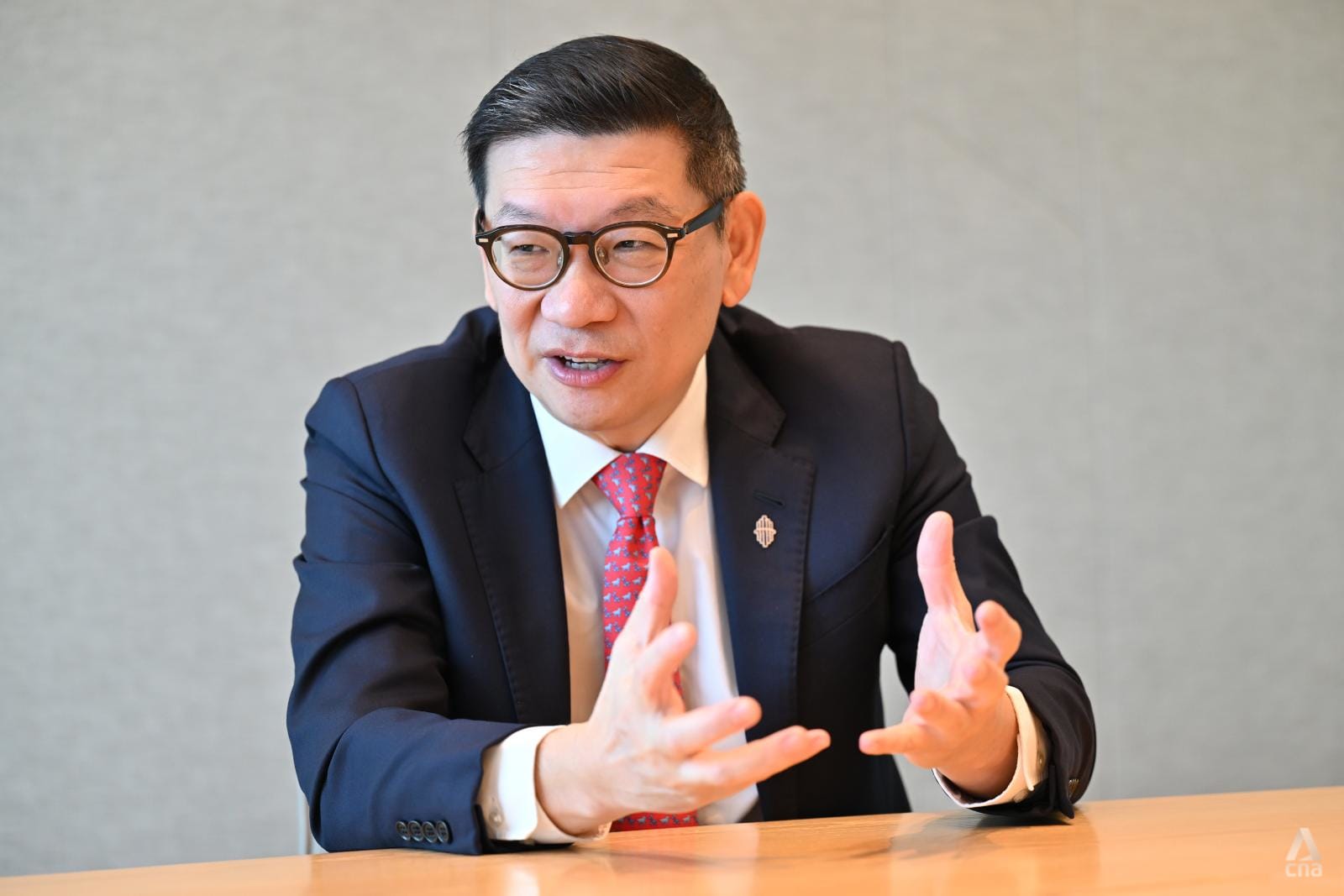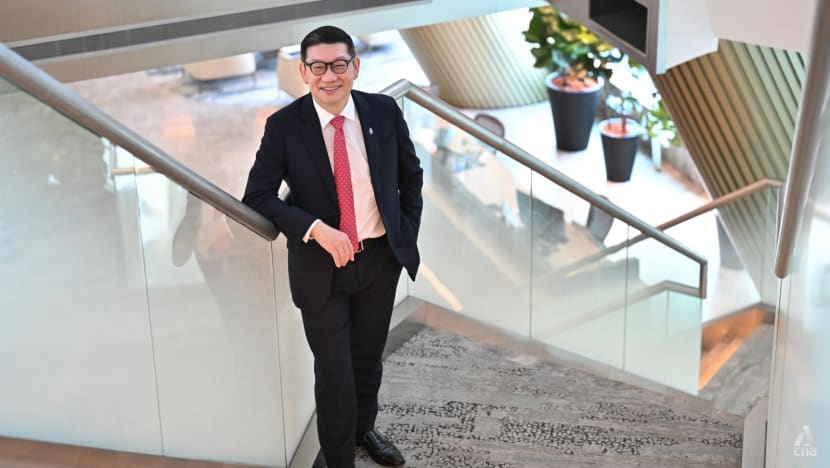Beyond profits, GIC considers the impact of its investments: CEO Lim Chow Kiat
GIC's investments have had a positive impact around the world by supporting businesses, building infrastructure and creating jobs, says CEO Lim Chow Kiat.

Lim Chow Kiat spoke to CNA about the impact of investments, sustainability, artificial intelligence and geopolitics at GIC's office in Capital Tower. (Photo: CNA/Jeremy Long)

This audio is generated by an AI tool.
SINGAPORE: As a sovereign wealth fund, GIC’s purpose is to manage part of Singapore’s reserves. But beyond its primary goal, the fund also considers the impact of its investments, including on people and the environment.
“In allocating capital to these different communities around the world, it also has a positive impact in terms of supporting businesses, building infrastructure, creating jobs even,” said CEO Lim Chow Kiat.
He was speaking to CNA ahead of receiving the Dwight D Eisenhower Global Citizenship Award in New York this week.
“We are thoughtful in how we deploy capital. We take a long-term view. We factor many things in even as we, of course, are in pursuit of good returns,” he said.
Mr Lim gave the example of GIC’s investment in Aegea, a water and sewage treatment company that serves millions of people in Brazil. GIC said Aegea has hired thousands of workers and reduced the discharge of raw sewage into rivers and seas.
“It has been a good investment, but it also contributes to public hygiene (and) water quality of that particular community.”
Sustainability has also become a big part of every decision GIC makes, Mr Lim said. The fund has supported American firm Duke Energy in its transition toward green energy and invested in Greenko, a renewable energy company in India.
GIC does not have a net-zero target and believes that letting go of carbon-intensive companies from investment portfolios would not reduce emissions in the real economy.
Instead, it prefers to stay invested in companies that are willing to make the transition toward lower emissions, get out of stranded assets and invest in new green technologies like carbon capture.
Asked whether most of GIC's investments are in the transition phase, Mr Lim said: “It’s a mix, but increasingly, more and more in the green area.”

OPPORTUNITIES AND RISKS: AI, GEOPOLITICS
Artificial intelligence could transform every business, and for that reason, GIC has to take it very seriously, said Mr Lim.
But as investors, the fund cannot just be dazzled by the technology.
“It’s great fun actually, playing with AI tools, but at the end, for investors, what we want to see is – what is the business model that really generates value,” he said.
It is also important to keep up to date with developments, said Mr Lim. There are also cyber, social and ethical risks involved.
“We are quite cautious with regard to short-term hype, there’s lots of enthusiasm. But we would also say actually, it is even more important to be attentive in the long term.”
The CEO said geopolitics has become an important factor in the past few years and is likely to stay for "quite a while".
“(It is) mostly a risk, even though it also throws up new opportunities,” he said, citing the global reconfiguration of supply chains that has benefited Southeast Asia, Mexico and India.
When reporting its results this year, GIC warned of "challenging" prospects, including sticky inflation and chronic geopolitical risks. The fund's 20-year annualised real rate of return was 4.6 per cent for the year ended Mar 31, the highest since 2015, when real returns hit 4.9 per cent.
Asked to respond to criticism that the metric is not easy to understand, Mr Lim said: "You underestimate the layman."
But he explained that the metric best matches GIC's mandate – to invest Singapore's reserves for the long term.
“CLEAR AND STABLE PURPOSE”
Mr Lim is the second Singaporean to win a Dwight D. Eisenhower Global Award after Singapore Airlines CEO Goh Choon Phong received one in 2016.
“We’re very proud and honoured that it actually matches really well with (what) GIC is,” Mr Lim said.
The award recognises his and GIC’s efforts to lead with “purpose, vision and responsibility for the benefit of society”.
On a personal level, he also believes living with purpose is important.
“Maybe that’s why I joined the company. This organisation has a very clear and stable purpose – from day one until now, it’s the same purpose,” he said.
That is part of what has kept Mr Lim working in the sovereign wealth fund for over 30 years, through roles ranging from portfolio manager to chief investment officer before he became the CEO.

Early in his career, there was an opportunity to move to Shanghai to develop GIC’s capabilities in investing in China, but “management used their discretion” and he ended up taking a position that needed to be filled urgently in the short-term asset division.
Asked if he regrets missing out on that opportunity, Mr Lim said he does not think he lost out by moving to the money market group. “The purpose is common,” he said.
But he did think of leaving GIC when he was younger.
“You wonder whether there are other things that you could do or explore, but at the end, GIC’s pull is too strong that I stayed on until now,” said Mr Lim, who tried to advertise for his organisation during his interview with CNA, citing competitive pay and the global nature of the work.
Being a father of three also affects how Mr Lim thinks about work – and aligns with GIC’s long-term investment mandate.
“They are the future. They, in a way, extend the horizons,” he said.
“You want them to do well, you want them to have a world that is getting better.”

















